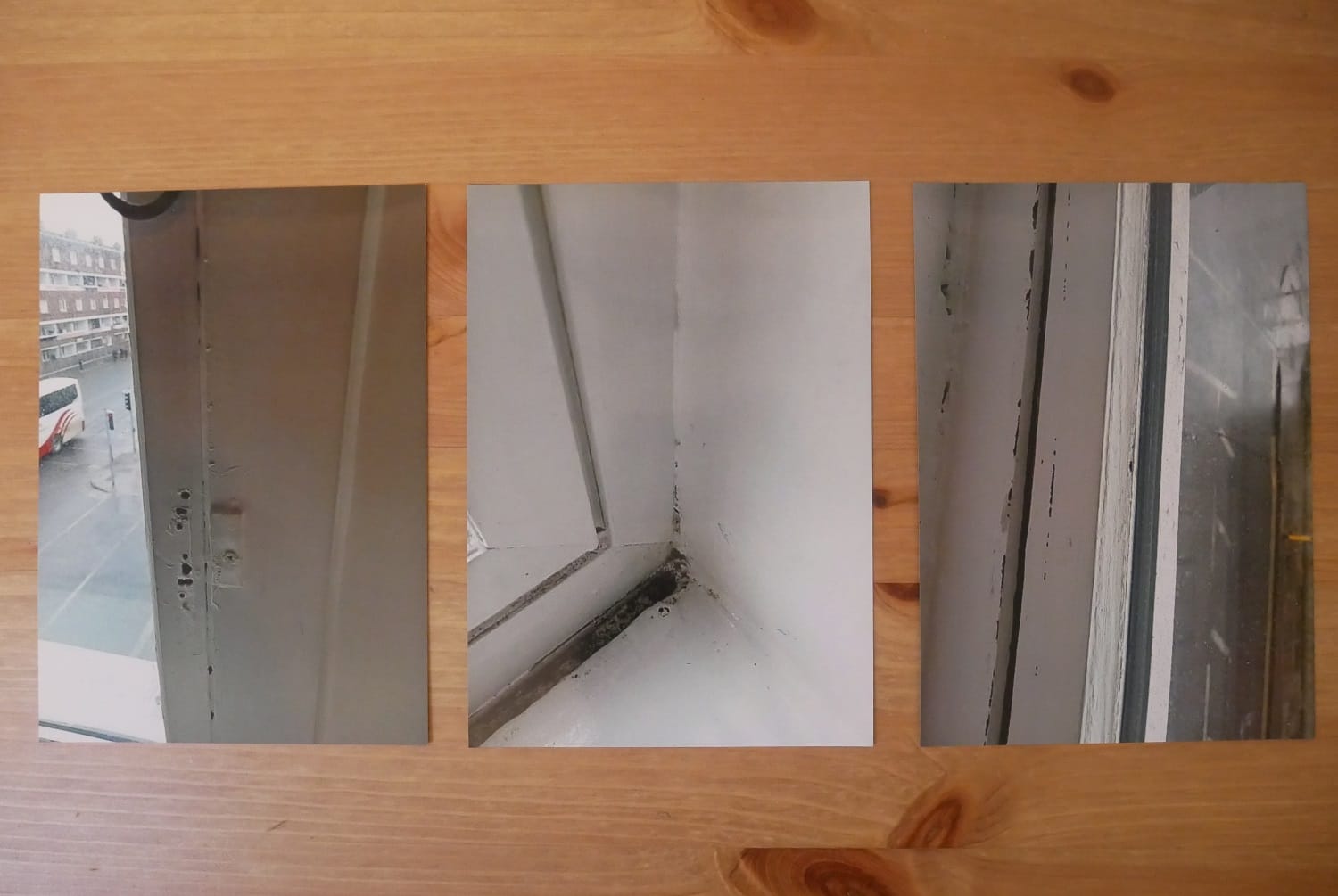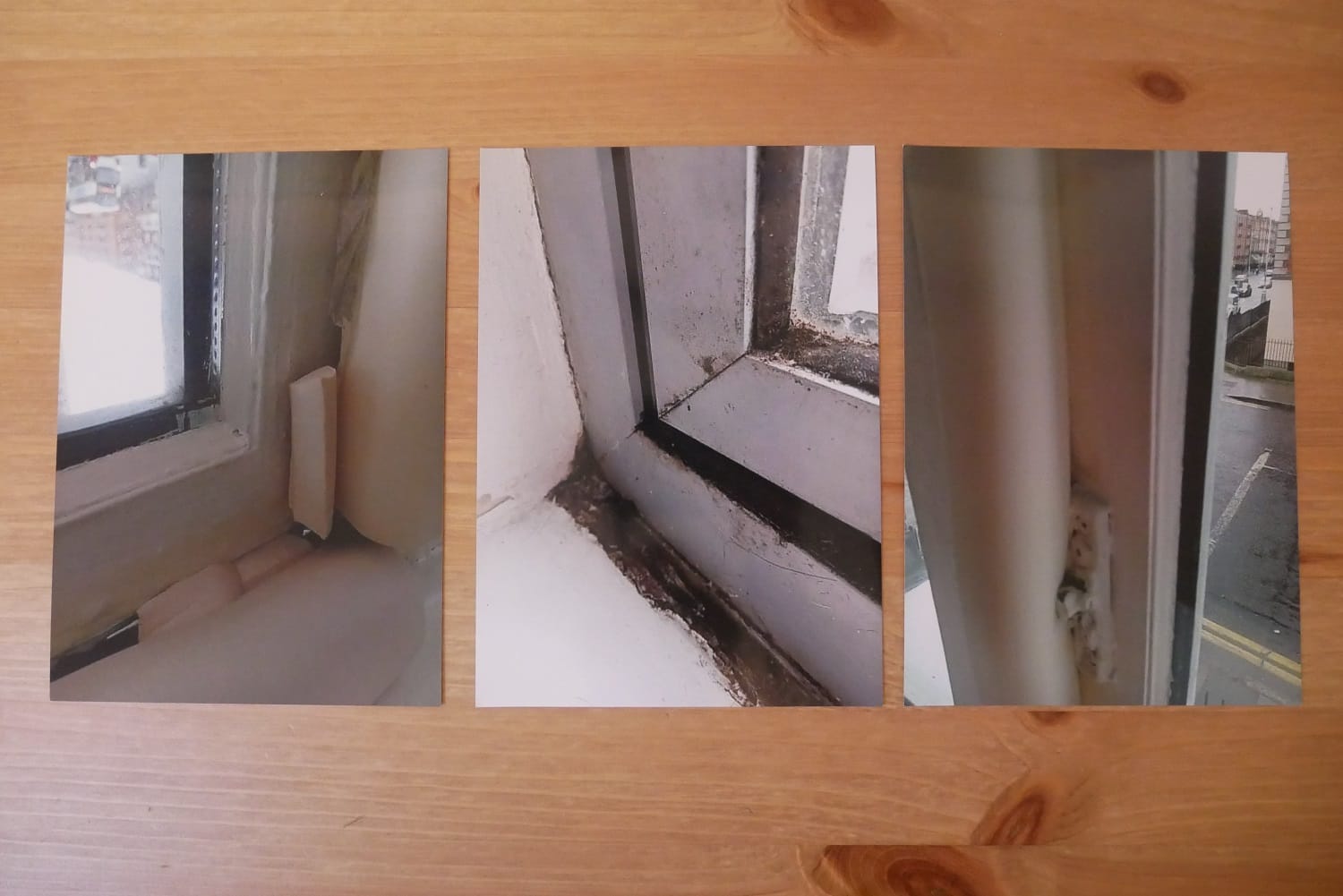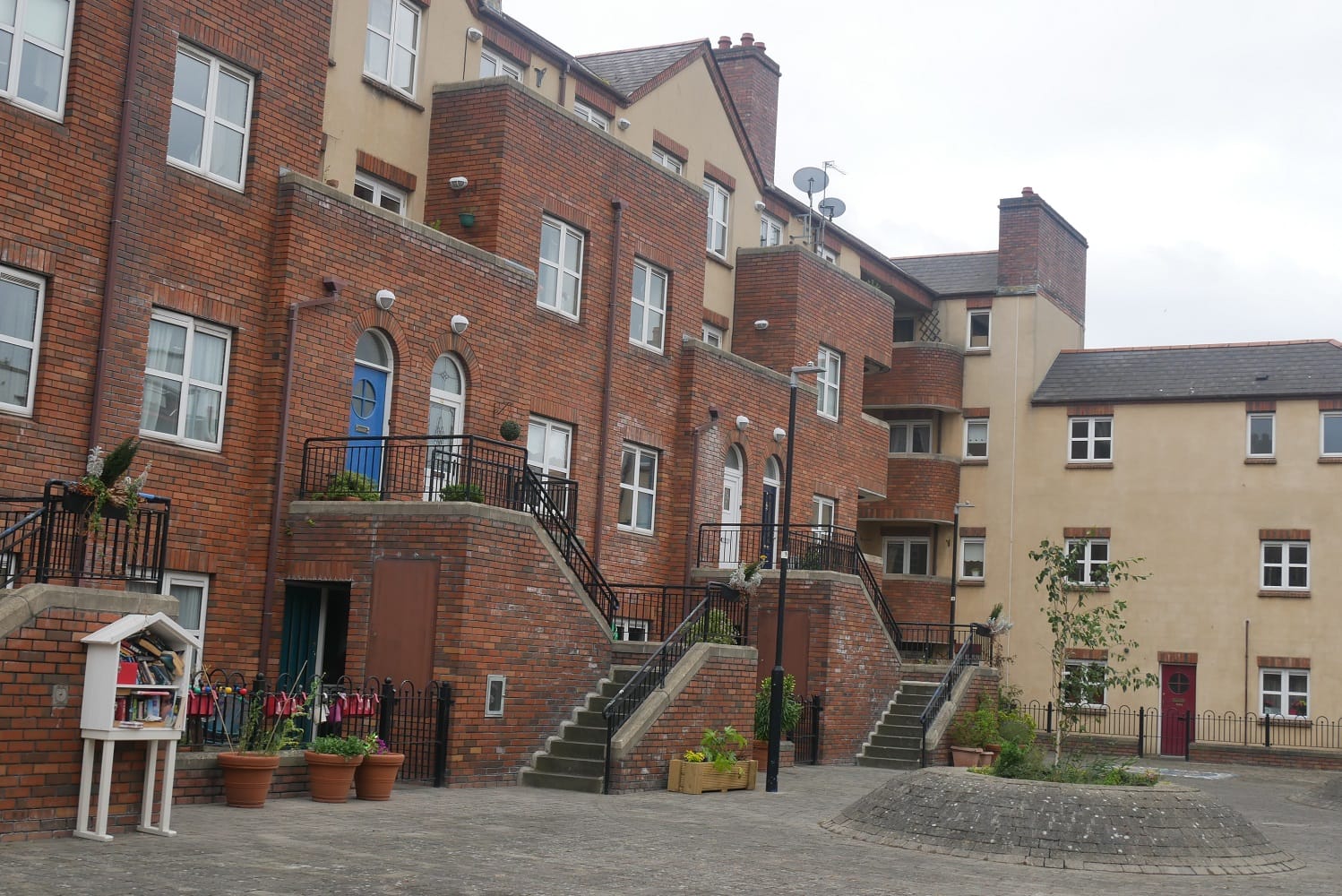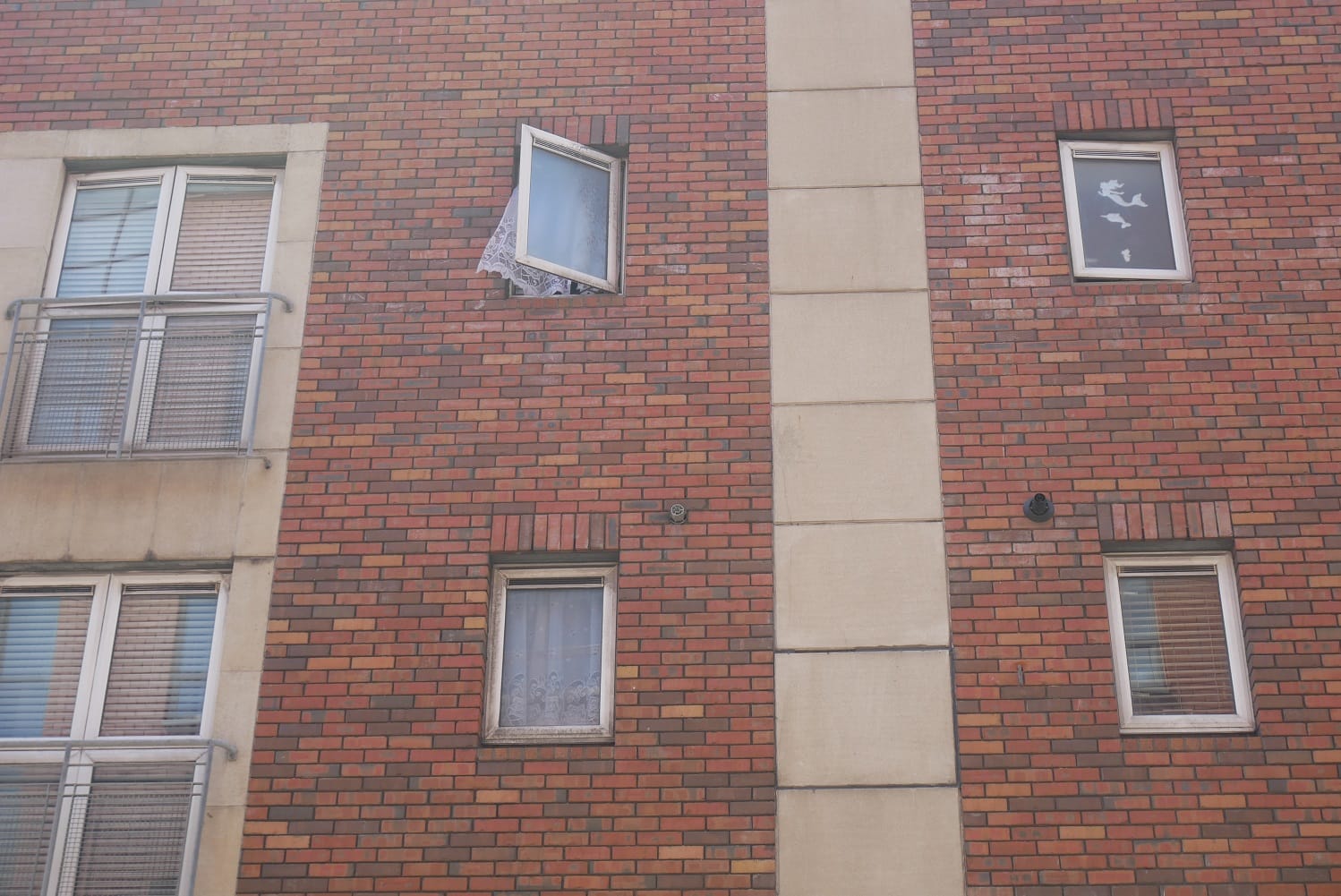What’s the best way to tell area residents about plans for a new asylum shelter nearby?
The government should tell communities directly about plans for new asylum shelters, some activists and politicians say.
“It might seem a very small issue in the bigger picture. But if you have windows that don’t function, you are more inclined to slip into fuel poverty. ”

On a Friday evening in mid-June, rain sheeted down over Lower Gardiner Street, pattering hard on the planks of the balconies of O’Brien Hall.
Inside her apartment in the social-housing complex, Joanne Casey could see little puddles gathering on the window sill in her sitting room, the water seeping in through the gaps at the bottom and sides of the old frame.
In front of the window is where Casey has her sofa.
“That’s what we’re sitting in on our backs. The back of our heads and everything else getting wet,” she said, filming the leaks with her phone.
Casey has been asking her landlord, Dublin City Council, for new windows for years, she says, and workers have even been in three times to measure up. But they’ve yet to be put in and Casey has no idea when that might happen.
Casey is not alone. Across the city, against a backdrop of soaring energy bills, hundreds of council tenants are waiting for new windows, say council figures.
Councillors say that progress on installing new windows is glacial. Some suggest that the council needs to hire more direct labour to make sure it can meet its obligations as the city’s largest landlord, but that funding that kind of hiring is tough.
A spokesperson for Dublin City Council said it has hired more people for housing maintenance in the last year and that it replaces windows based on need.
“The Council regularly checks our processes to ensure that we maximise output, whilst also maintaining quality and we will keep this under review to ensure the best possible provision of services,” they said.
A week earlier, Casey pushed forward her plush grey sofa – a recent replacement after her old one kept getting soaked and ruined with water marks – to clear a space by the main living-room windows.
She scrunched up the blinds, to show the fresh-white windows.
When council workers have come in, they’ve said how lovely they are, she says. “It’s because I paint them, to try and keep them clean.” Every morning she sprays them with bleach too, she says, to kill any mould glomming on.
But there are gaps around the frames. Casey peels off a bit of sticky foam strip that’s hanging along one edge, which she put in to seal the gap. “I put this on to try and keep us warm,” she says.
Along the wall from Casey’s main sitting room window is a smaller window, with two sides that are supposed to open out. It’s supposed to be the fire escape, she says.
The left side of the window doesn’t open. The right side, with no handles, doesn’t close. Even pulled to, there’s a gap of a couple of centimetres. “It’s open constantly,” Casey says.
In winter, Casey has the blinds down, curtains closed, and stuffs up gaps with towels, she says, and the family will sit on the sofa, with a duvet, hot water bottles, and the heating on.
“It’s brutal. It does be freezing,” says Casey. “Because the heating’s going back out. It’s not staying in the house.”


In both Casey’s apartment, and her mother’s directly above, some of the windows don’t open at all.
Their theory is that the tenants who lived there before them took drastic measures. “I think they glued them because they were cold,” says Casey.
Meanwhile, the handle for her bathroom window recently came off in her hand, she says, so he has to go out to a balcony to reach over and push it shut. “It doesn’t stay shut.”
It’s miserable for her grandkids, she says, trying to have a shower but the room is freezing. She tries to stuff it up with newspapers sometimes, she says.
As of November last year, the council was making windows for 260 properties in its workshop, had measured a further 91, and had 749 properties waiting to be assessed for windows, according to a council report.
People are constantly looking for new windows and doors, says Daithí Doolan, a Sinn Féin councillor. “And you go on a long waiting list that moves grindingly slow.”
Casey says she remembers a council worker first dropping in to measure the windows in her living room nine years ago. “They told us we were getting new windows. Delighted we were.”
Again, about six years ago, they measured her windows and her mother’s Ann’s and neighbours’ too, she says. They all said they’d have a party once they got the windows, says Ann Casey.
Two years ago, somebody turned up yet again to measure and, at first, Joanne Casey said she wouldn’t allow them but then they suggested they had done the measurements wrong, she says. “So we let them.”

On the other side of the city centre, a short stroll away from streets of busy shops, is Wolftone Close, a quiet social-housing complex tucked up three grand flights of stone steps off Wolfe Tone Street.
Two years ago, residents there petitioned the council to try to get movement on issues they say they face with windows in their complex.
By then, the problems with the windows were long-standing, says Catherine Winston, who lives on the close.
Winston was among the first batch of tenants to move in here in December 1998, she says, and quickly commented on how the side vents of the windows wouldn’t close. “It was actually warmer outside than in your home.”
Meanwhile, windows at the back of the complex open out high above Jervis Street and tenants want windows with child-safety locks, that open inwards, says Winston.
“To clean them, you have to hang on for your dear life,” she says. “It’s a health and safety hazard.”
The council put new windows into one home since that petition, she says, and in another apartment they replaced one window that had a frame falling apart – but left the other windows in the same place untouched.
“I just thought it was disgraceful,” says Winston, who alongside another tenant, Stephanie McGrane, has been leading engagement with the council. “If you can put it in one, you can put it in them all.”
Legally, the council has to keep its homes in a proper state of repair. That includes maintaining windows in a good condition and repair, so they’re not defective.
Dublin City Council’s tenant handbook says that maintenance requests have three tiers of speed for repairs. Emergency requests will be followed up immediately, it says, while urgent ones may take up to five working days and routine ones, up to eight weeks.
A council spokesperson didn’t give exact timelines for how long a tenant in need of new windows, who joins the list today, would expect to wait for them.
It depends on how urgent the work is, they said. The council assesses the windows, categorises it by urgency, and places it on the list based on that.
“However this is a fluid list,” said the council spokesperson, so when more urgent requests come along, they’re bumped higher up. “This is to ensure that all works are carried out on a priority/need basis.”
Casey, the tenant at O’Brien Hall, says the council should put in new windows on a schedule, when they know they’ve hit the end of their lifespan.
“They’re here 28 years,” she says, of the oldest windows in the O’Brien Hall complex.
A council spokesperson said there isn’t any programme in place to switch out windows automatically after a certain time. “It is felt that replacing functioning working windows when not needed is difficult with limited public funds.”
Ray McAdam, a Fine Gael councillor, says the lack of planned maintenance is part of a wider problem.
“I think, quite frankly, in my 13 years of experience at the city council, the city council has never been able to get on the front foot in terms of a proactive approach to housing maintenance,” he says.
Doolan, the Sinn Féin councillor, says: “One of the issues is they simply don’t have the staff, the carpenters, to carry out the work.”
The council relies on a mix of contractors and in-house staff for maintenance, he says. “And it’s grindingly slow.”
Labour Councillor Dermot Lacey says that relying on indirect labour means the council has to go through a procurement process for every little job. “That delays the process.”
There were 158 tradespeople working in the council’s housing-maintenance section at the end of 2021, according to council figures. The council has more than 25,000 social homes.
A council spokesperson said the council has taken on new staff in housing maintenance in the last year, including area maintenance officers, foremen, carpenters, plumbers, general operatives and apprentice tradespeople.
Lacey, the Labour councillor, who is head of the council’s housing committee, says the new hires are small. “They’re marginal numbers. They’re minor. We need a larger programme.”
Lacey says the council is missing a big opportunity to lead in hiring and training apprentices too.
But councillors also need to have an honest discussion about where that money is to come from, says Lacey. “Our politics is very dishonest.”
There’s less to spend on maintenance these days, he says, as the social rents are based on tenants’ incomes. “The earnings of tenants probably got lower over the years. We need to get to a point of no income limits on social housing.”
He says the council also struggles to collect rent arrears and recouping more of that would be a big help.
Giving councillors more powers over where the council’s money is spent would help, as would councillors voting to raise the local property tax and bring in more cash, says Lacey.
“Councillors need real power over the budget,” said Lacey. Then they could plough money into maintenance for a few years and catch up on the big backlog, he said.
At the moment, not all of the money currently paid by council tenants to the council is spent on maintenance.
In 2021, the council brought in €93.2 million in social rents. But the estimated spend on housing maintenance and improvement that year was €73.5 million, according to the council budget.
In June 2018, two academics at University College Dublin, Aideen Hayden and Michelle Norris, recommended that councils ringfence income from rents to spend on social housing, rather than treating it as a general income that goes into the big pot to be spent on anything.
Winston, who lives in Wolfetone Close, says it’s about priorities, and the council spends so much on stupid things. “They can find the money when they want the money.”
Casey, the tenant at O’Brien Hall, says the council has money, it just cares more about new housing going up. “And they’re forgetting about their old tenants.”

As part of the same research, the same two academics raised questions about whether local authorities hold off on some maintenance, as they prefer to do upgrades paid for by central-government grants – through schemes such as refurbishment of “voids”, which are empty council homes, or energy retrofit programmes – rather than paying for maintenance out of their own budgets.
“This is an inefficient and ultimately more expensive pattern investment, because deferring maintenance often necessitates higher levels of spending when the work is finally carried out,” the researchers conclude.
That Dublin City Council follows this pattern is supported by some responses to councillors’ queries.
In January 2021, then-People Before Profit Councillor Tina MacVeigh asked when a tenant in the Oliver Bond flats, who had been told they needed new windows, might expect them.
“It is current policy within Housing Maintenance to replace windows in Oliver Bond under the Voids Refurbishment Framework,” said the response from the council official Frank D’Arcy.
Said McAdam, the Fine Gael councillor: “It’s not always about gutting places and completely rebuilding them or refurbishing them. It’s actually about making small changes.”
“Upgrading windows in my mind is a small piece of work that would reap significant dividends for our tenants,” he says.
Said Doolan: “It might seem a very small issue in the bigger picture. But if you have windows that don’t function, you are more inclined to slip into fuel poverty.”
In the meantime, Casey jokes about withholding her rent. She can’t – she’s signed up for it to be taken right out of her disability payment each month.
But she warned a council worker that she would. “I just said to him on the phone,” she says. “And I’m going to pay for windows.”
In the private rental sector, tenants can – if they follow a process – fix something themselves and refund themselves from their rent. Why not council tenants too, if they can afford it?
McAdam, the Fine Gael councillor, said he doesn’t think that is practical. “The council maintenance budget would be spent repaying tenants who got their windows done.”
He suspects that the proportion of tenants who have gotten their own windows put in is significant, he says. “I would suspect it’s a significant minority of the total number of council tenants.”
A council spokesperson said that some of the windows in O’Brien Hall are originals. “But approximately half of the tenants have replaced them themselves.”
McAdam says that a better policy change would be that the council still does maintenance on windows that residents have paid for themselves.
“The tenant should then not be punished by the city council refusing to do maintenance works,” he says. “I have lost count of the number of times where I have dealt with that kind of case.”
At Wolfetone Close, Winston says she has been trying to comfort worried elderly residents in the complex about what is ahead.
“With rising electricity bills, we’re coming into another winter, and people aren’t going to be able to cope,” she says.
But she’s been reassuring them that they’ve been through this before, that they could bring a blanket downstairs and wrap up warm.
It’ll just be back to the era of forty coats, she says, when you’d throw forty coats on the bed for comfort each night. “You just have to get your mind around it.”
She stresses the fears of the elderly in conversations with the council, she says. “We’ve been complaining for a very long time. It’s time they took action.”
[CORRECTION: This article was updated at 10.40am to correct who was speaking on one occasion. Apologies for the error.]
Get our latest headlines in one of them, and recommendations for things to do in Dublin in the other.